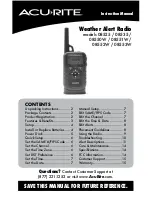
4
4. Pre-Installation Checkout and Site Survey
4.1 Pre Installation Checkout
Before installing your weather station in the permanent location, we recommend
operating the weather station for one week in a temporary location with easy
access. This will allow you to check out all of the functions, insure proper
operation, and familiarize you with the weather station and calibration
procedures. This will also allow you to test the wireless range of the weather
station.
4.2 Site Survey
Perform a site survey before installing the weather station. Consider the
following:
1. You must clean the rain gauge every few months and change the
alkaline batteries every 2-3 years. Provide easy access to the weather
station.
2. Avoid radiant heat transfer from buildings and structures. In general,
install the sensor array at least 5’ from any building, structure, ground, or
roof top.
3. Avoid wind and rain obstructions. The rule of thumb is to install the
sensor array at least four times the distance of the height of the tallest
obstruction. For example, if the building is 20’ tall, and the mounting pole
is 6’ tall, install 4 x (20 – 6)’ = 56’ away.
4. Wireless Range. The radio communication between receiver and
transmitter in an open field can reach a distance of up to 330 feet,
providing there are no interfering obstacles such as buildings, trees,
vehicles, high voltage lines. Wireless signals will not penetrate metal
buildings. Under most conditions, the maximum wireless range is 100’.
5. Radio interference such as PCs, radios or TV sets can, in the worst case,
entirely cut off radio communication. Please take this into consideration
when choosing console or mounting locations. Make sure your display
console is at least five feet away from any electronic device to avoid
interference.
5. Getting Started
The WiFi weather station consists of a display console (receiver), an all in one
sensor array, and wireless thermo-hygrometer-barometer.





































